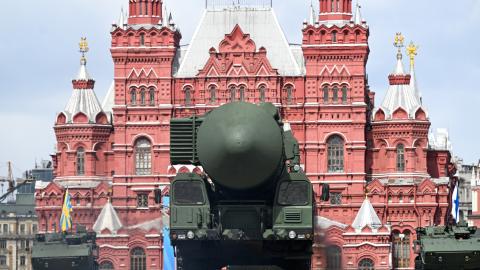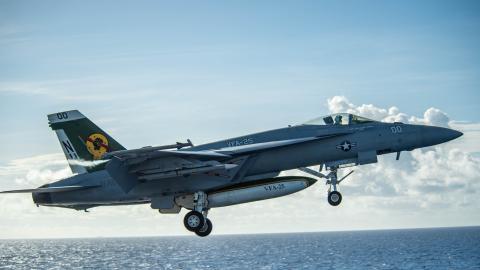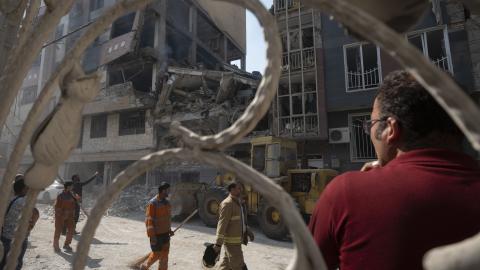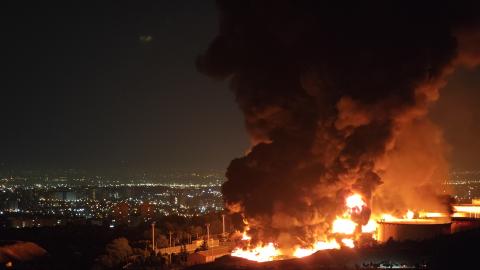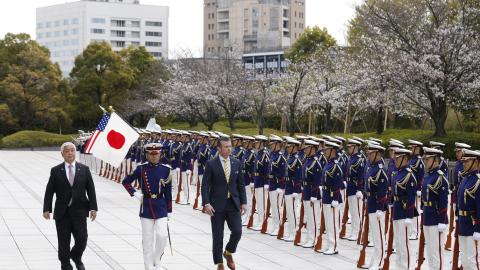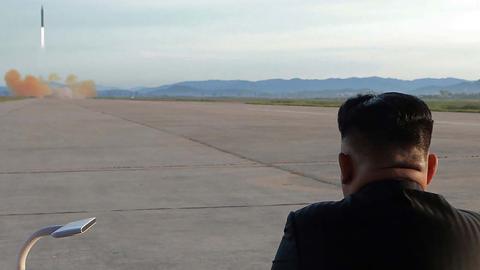Secretary of Defense Mattis does not see “the divergence as strong as some have interpreted,” that is, a divergence between President Trump’s recent tweets and Secretary of State Tillerson’s recent statements on North Korea. That’s what he told the Senate House Armed Services Committee yesterday. One might even infer from Mattis’s remarks that there’s an overarching U.S. strategy to dealing with North Korea, and each senior U.S. official is more or less playing his role appropriately.
Some have criticized the president and his Cabinet for a failure to “get on the same page, ” but before criticisms can be fairly offered, it’s necessary to take a step back and try to understand the U.S. strategy as the president seems to understand it. First, there really isn’t a “same page” in the literal sense. There are no talking points (at least that the president uses), and there is no script. But that doesn’t mean there isn’t a North Korea strategy.
Secretary Tillerson recently told reporters “We are probing, so stay tuned.” And then, “We ask, ‘Would you like to talk?’ We have lines of communications to Pyongyang — we’re not in a dark situation, a blackout.” Adding, “We have a couple, three channels open to Pyongyang.”
The following day the president tweeted the following:
“I told Rex Tillerson, our wonderful Secretary of State, that he is wasting his time trying to negotiate with Little Rocket Man,” using the moniker he has chosen for the North Korean dictator Kim Jong Un. “Save your energy Rex. We’ll do what has to be done!”
A few hours later Heather Nauert, the State Department spokeswoman, wrote on Twitter: “#DPRK will not obtain a nuclear capability. Diplomatic channels are open for #KimJongUn for now. They won’t be open forever.” The second part of the tweet seems consistent with what both Tillerson and Trump have said. Channels are open, but, presumably, North Korea has to meet certain conditions before the United States will negotiate.
The first part of Nauert’s tweet, however, is problematic. North Korea has nuclear weapons, lots of them. It’s hard to imagine that this tweet wasn’t carefully crafted, and so perhaps the State Department didn’t want to publicly put too fine of a point on what would be forbidden. At this point, what makes the most sense, in the near term, is for the United States to forbid North Korea to obtain a reliable nuclear-capable ICBM, and the long-term goal should be the denuclearization of the Korean Peninsula. The State Department did clarify that Nauert meant the North Koreans would not be permitted to marry a nuclear warhead with a missile.
This is how General John E. Hyten, Commander, U.S. Strategic Command, answered when I asked him about the status of the North Korean’s long-range nuclear missile program:
The one thing they have not demonstrated to the United States is the ability to put everything together end to end and use it. And I'll just say that when we, the United States, built that capability, that endgame was the hardest part for us. And that's why we built a couple of big test ranges - the Eastern Test Range and the Western Test Range. That's why we built Kwajalein Atoll. That's why we put the huge radars out there in order to characterize those things. And I can tell you that the North Koreans did not have that kind of infrastructure, so they have not demonstrated us the whole thing end to end. But the point that you have to remember is, it's not - if you're going down that path, you'll eventually figure it out. You will, whether you figure it out by luck, by happenstance or by just sheer trial and error of doing things over and over, and fail, and fail and fail until you succeed. You'll eventually have figured it out. So we have to assume. And as the commander of strategic command, I have to assume that they have the bomb, that they will have the capability to deploy it on an ICBM.
Perhaps the State Department should just stay away from talking about North Korea’s capabilities and stick with publicly telling Kim Jong Un to refrain from testing ballistic missiles and nuclear weapons and to relinquish these programs.
Aside from the confusing State Department tweet, taking the President’s and the Secretary of State’s statements along with previous statements on the threats of military force and whether or not those threats and diplomacy are mutually exclusive (they most certainly are not The President is communicating he does have military options he is willing to use to prevent North Korea from obtaining the ability to credibly threaten the United States with a reliable nuclear intercontinental ballistic missile. It is obvious that the President is determined to convince Kim he means this. These are not empty threats.
It is also clear that the Trump administration, all the way up to the president himself, prefers to solve the North Korean problem peacefully, without military force. How can we know this? Because the administration is taking the time to do the diplomatic heavy-lifting to lead the international community to squeeze the Kim regime to force him to his knees. Officials have repeatedly said a war with North Korea would be a massive tragedy, thousands of lives lost. And, although trivial in comparison to thousands of lost lives, war with North Korea would disrupt the President's domestic agenda. War on the Korean Peninsula would be a disaster from every possible angle.
But, given a choice between allowing the Kim regime to hold a nuclear gun to the head of the American people, or war with North Korea, the president chooses the latter, as he should.
North Korea analysts will say that above all, Kim is motivated primarily by “regime survival.” And, Kim believes he needs a nuclear ICBM to guarantee his regime's survival.
Well, regime leaders should believe that President Trump is serious about his willingness to use force against the regime if it does not stop and turn over its nuclear missile program. China should believe him, too. If China believes Trump might go to war with Kim, it might finally move to solve the problem, either by forcing Kim to give up his program by starving the regime to the brink of collapse, or by replacing Kim with a more obedient strong-man.
Put another way: it isn’t Kim's nuclear missile program that will ensure his regime’s survival-- meeting U.S. demands will ensure the Kim regime’s survival. Once Kim is convinced of this, Secretary Tillerson can walk him through the next steps. But the channels won't be open forever.
